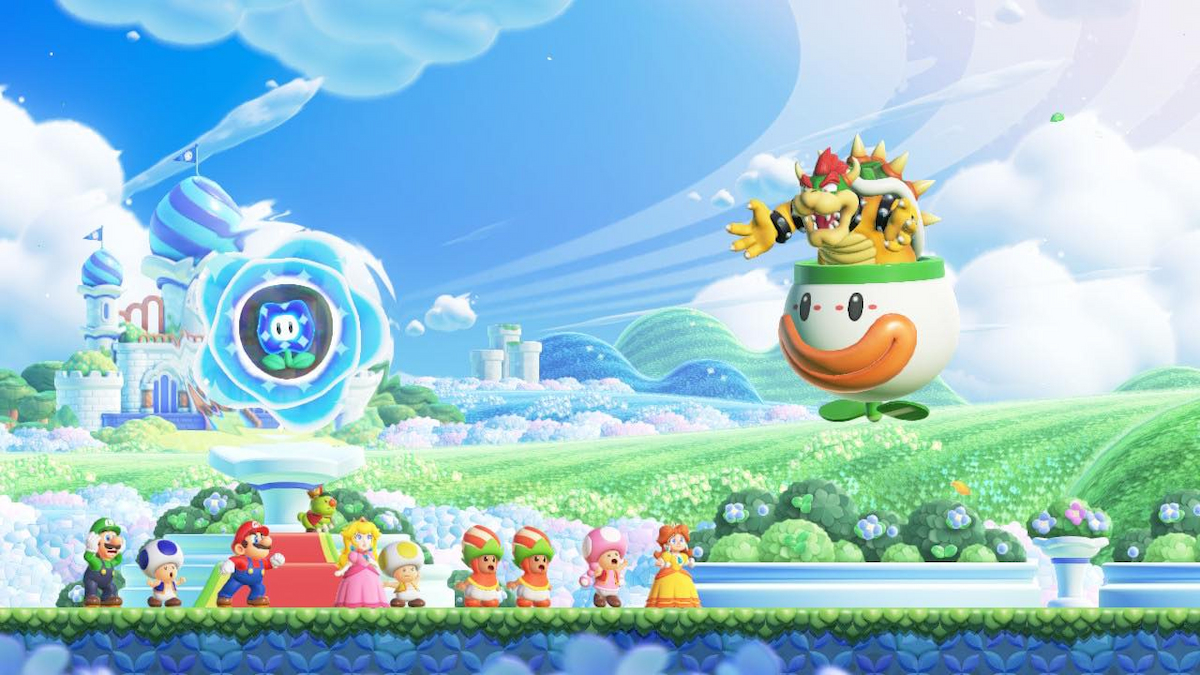I’ve waited 30 years for Nintendo to release a game like Super Mario Bros. Wonder.
In the early days of the plumber’s signature franchise, each game was branded with a sequential number. Most of us are familiar with the original NES trilogy (squabbles about the “real” Super Mario Bros. 2 notwithstanding), but slightly less known is that Super Mario World was actually labeled as “Super Mario Bros. 4” in Japan. However, after this fourth mainline entry, the series took a sharp turn away from that classic side-scrolling style. Super Mario World 2: Yoshi’s Island is a stellar game, but it’s not one that I nor Nintendo consider a mainline Mario game. And with Super Mario 64, it appeared that the moustached hero’s future was now firmly in the third dimension.
We, of course, got a return to classic side-scrolling with the New Super Mario Bros. series. Yet, while I enjoyed these games, they felt like filler content after the first Nintendo DS installment. Super Mario Bros. 3 and World weren’t legendary games because you could stomp on Koopas and go down pipes. Rather, they were special because they were filled to the brim with inventive level design and creative challenges. They contained secrets within secrets that encouraged you to explore. Each game offered tight, impeccably crafted platforming overflowing with imagination. For the longest time, I truly believed we’d never see another 2D Mario game like these.
But now, I’m beyond happy to tell you all that this hiatus of fantastic side-scrolling Mario titles is finally over. Not only is Super Mario Bros. Wonder a spectacular game, but it’s also the first title I would happily call Super Mario Bros. 5.
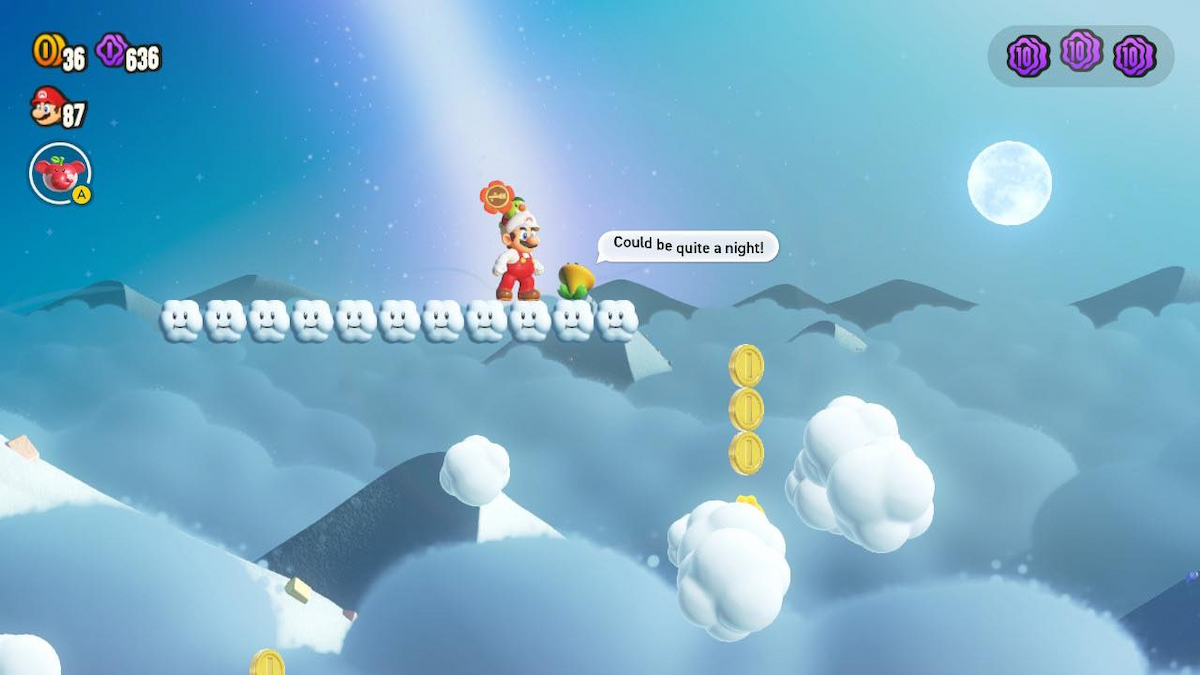
Super Mario Bros. Wonder (Switch)
Developer: Nintendo
Publisher: Nintendo
Released: October 20, 2023
MSRP: $59.99
You can feel it all over
Super Mario Bros. Wonder kicks things off by throwing Mario and the gang right into the Flower Kingdom. Where the Flower Kingdom exists in relation to the Mushroom Kingdom, I can’t tell you. But they might as well be one and the same because Bowser’s here regardless, and this time he’s used the elusive power of the kingdom’s Wonder Flower to merge with a castle. Yes, that’s literally our story this time around. Faced with psychedelic powers that they presumably will never understand, Mario and his gang of friends/princesses/pets/Nabbit rush off to rid Bowser of his immense power and restore peace to this place we were introduced to five minutes ago.
I’m going to go out on a limb and assume you know that story generally isn’t the selling point of mainline Mario games. The emphasis is instead on the overarching landscape and the places you’ll explore. Relative to past Mario games, I’d say the Flower Kingdom is basically good. The overworld sits somewhere between Mario 3 and World, featuring a healthy amount of secret paths while retaining a mostly linear structure. Each individual world has its own identity this time around, which often makes the act of simply finding levels a game on its own. That sense of discovery from the classic Mario titles is alive and well here.
I will say that Super Mario Bros. Wonder doesn’t quite capture the scale and spectacle that most mainline Mario games boast. It doesn’t have that moment of, say, discovering New Donk City or flying through space as a stirring orchestra plays. Don’t get me wrong, the Flower Kingdom is way superior to anything in the New Super Mario Bros. series. But as visually clean as the game is, the overarching identity isn’t quite as strong as, say, the stage play aesthetic of Super Mario Bros. 3. Fortunately, that’s one of the harshest criticisms I’ve got.
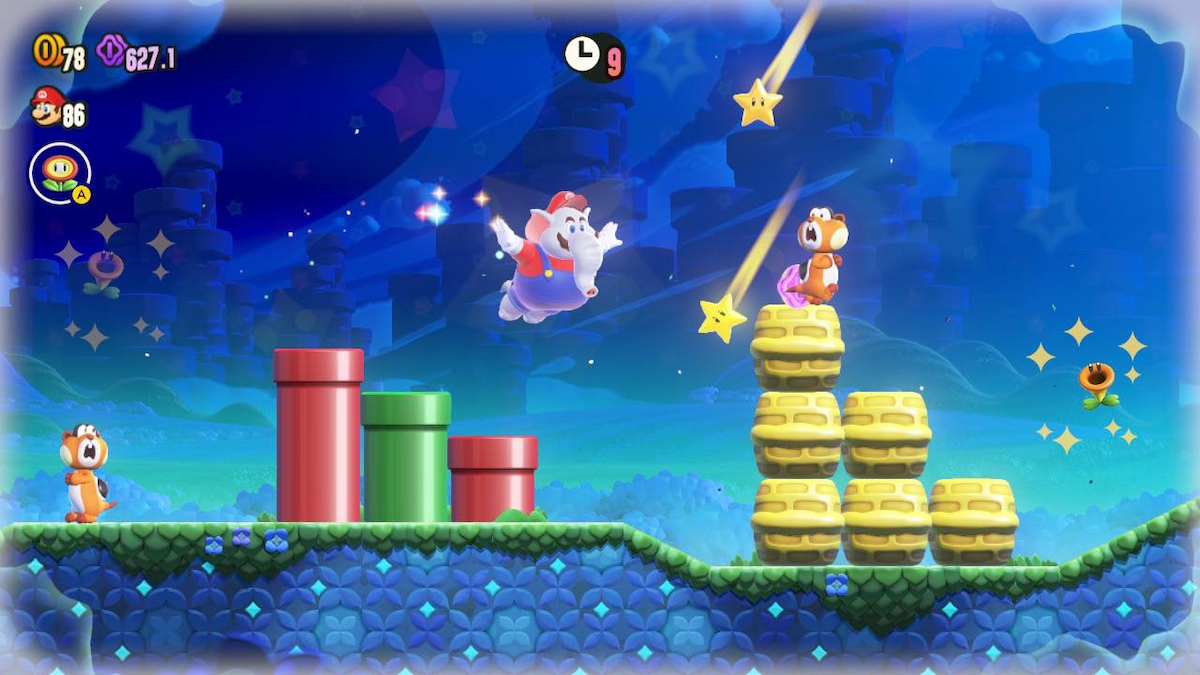
Living in a pastime paradise
The real meat and potatoes of a Mario game is its level design and holy stromboli does Super Mario Bros. Wonder deliver absolute quality.
In other side-scrollers, including some Mario games, you might see entire worlds based around a central gimmick. For example, if a world has quicksand you slowly sink into, you might expect several levels exploring all the possibilities of this mechanic. Super Mario Bros. Wonder looks at that tradition, smacks it across the face, and makes any game following the old convention look like a joke by comparison. Almost every level in Wonder introduces at least one fresh idea that’s specific to that stage. Whether it’s a new enemy type, a new obstacle, or even something that bends the genre of the game itself, you are constantly seeing new things.
It’s not just the quantity of ideas, either, but the quality as well. Even something as simple as a single new enemy type completely changes the way you interact with a level. Yet because the game constantly introduces new gimmicks and mechanics, I always felt like I was on my toes, even in the most banal situations. By the time I finished the first world in Super Mario Bros. Wonder, I’d seen the type of variety that easily sustains a lesser game. That’s the scale of what we’re talking about here.
And that’s before you even get into the central Wonder Flower mechanic, which amplifies the element of surprise even further. For those just tuning in, Wonder Flowers are best described as complete surprise boxes hidden in most stages. Getting one changes its respective stage in unpredictable ways, usually increasing the difficulty in some small way. The Wonder Flower effects run an absolute gauntlet of ideas, often completely mixing up the way you interact or look at the space around you. I legitimately can’t think of a single Wonder Flower gimmick that I didn’t at least like.
Due to spoiler considerations, I have to keep it to vague terms around the levels and Wonder Flower effects. But even if I wanted to reveal everything, I’d need to spend another 5,000 words describing all the ideas Super Mario Bros. Wonder packs in its design. It is just hit after hit after hit, with maybe only a couple of levels I could have done without. I legitimately don’t know how anyone could be bored playing this.
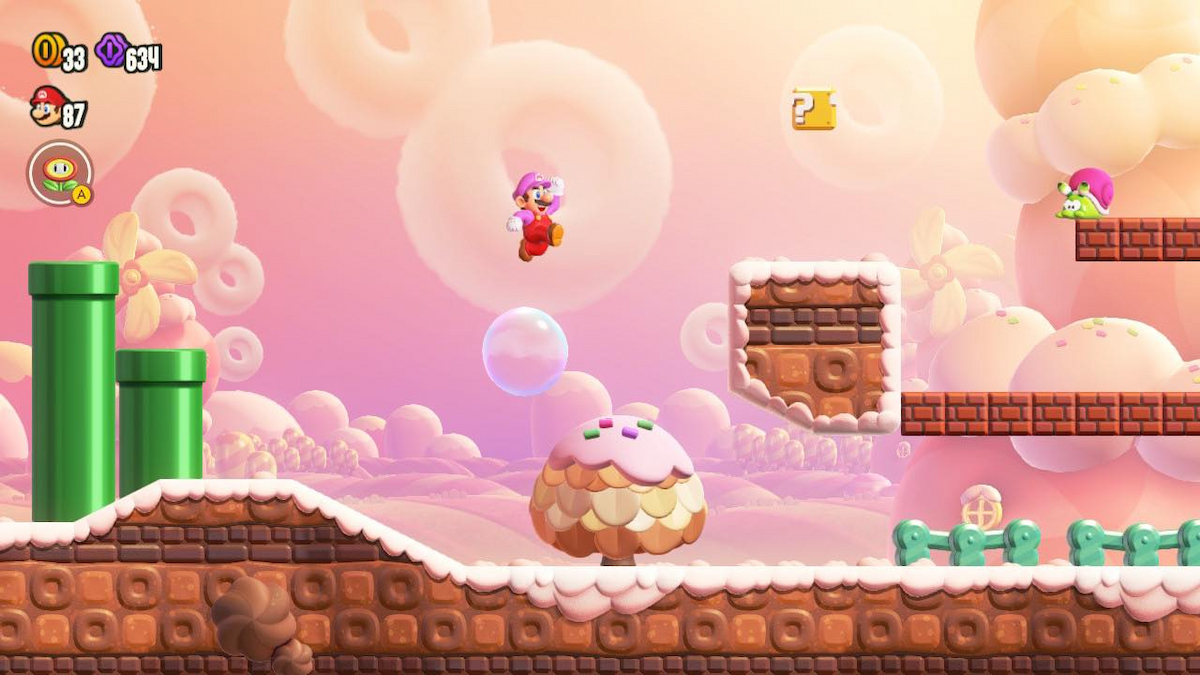
As now can’t reveal the mystery of tomorrow
Fortunately, rock-solid core mechanics back up Wonder’s stellar level design. I’ve seen some speculate that Super Mario Bros. Wonder has the same physics as the New series games, which I can safely refute. I actually popped in New Super Mario Bros. U Deluxe after finishing Wonder, and I was shocked by the difference. While things like jump arcs might be similar, Mario and friends have much tighter controls here. I’d say movement is closer to Super Mario World while retaining modern staples like wall jumping and the like. Wonder is an absolute joy to control, even if you aren’t engaged in any wildly inventive mechanics.
The new power-ups add quite a bit of flavor to the experience as well. The standout here is the Elephant form, which gives you a melee attack at the cost of a wider hitbox. It’s a fun tradeoff between positive and negative effects, but fortunately, Elephant form never felt cumbersome to play either. Meanwhile, the Bubble power-up seems to exist to help both the most casual and hardcore players. The bubble attacks are powerful but kind of slow, so I’d only use it offensively in very specific situations. However, since you can bounce off bubbles you launch, I imagine speedrunners will find fun ways to use this form.
Finally, the Drill power-up is more of a “use this to find secrets” kind of pickup. By digging into the ground or the roof, you’ll typically uncover nooks and crannies you’d be completely locked out of otherwise. You could compare it to the Mini Mushroom from the New Super Mario Bros. series in that respect, though the Drill is at least a bit more useful in standard play. Honestly, this one might be better than I give credit for, it just feels wrong to try to take out enemies by jumping up into them.
I really appreciate that the new toys in Wonder aren’t particularly redundant. For example, Bubble initially looks similar to the Fire Flower, but the downward arc and rapid fire of the fireballs still make it preferable in many situations. Each power-up adds new ways to look at each stage, even if the level design only occasionally tests the limits of what they can do.
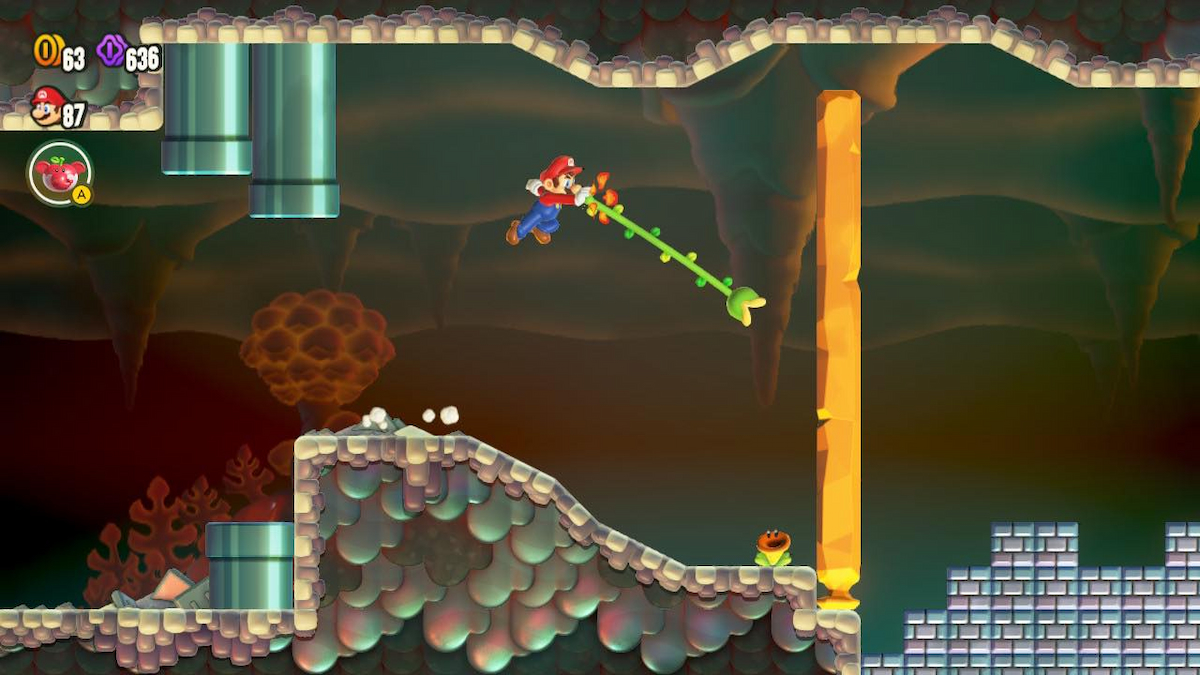
Don’t you worry ’bout a thing
Super Mario Bros. Wonder also adds a few new supplemental systems to the mix. The Badge system is the most obvious addition, taking some influence from the recently reinvigorated Paper Mario series. These add bonus perks to Mario’s moveset, ranging from a parachute that lets you slow your fall speed to more passive effects like a coin magnet. Badges ride a fine line, as they expand your movement capabilities while working hand-in-hand with the aforementioned power-ups.
The game doesn’t typically demand using certain Badges to find secrets or anything, but they do help on occasion. I spent most of my time with a go-to Badge equipped, but I enjoyed experimenting with other picks to make specific optional objectives easier.
The addition of a passive online mode also makes an appearance here. You’ll occasionally see the ghosts of other players floating around, as well as standees you can strategically place to help revive other players or point out secrets. I didn’t get to test this much during the pre-release period, but the small interactions I had with others were pretty fun. I got the sense that the online features in Wonder are more to alleviate the difficulty than to add new dynamic gameplay, though. This isn’t a hard game by any means, but I could see someone totally new to side-scrollers having trouble here. The online features should make the game beatable by even absolute beginners, with the hunt to 100% Wonder reserved for those more serious about Mario games.
I do feel like more could be done with the online infrastructure. Obviously, the inclusion of real online co-op would be welcome. Yet even that aside, it’s a shame that the game allows for things like racing friends in courses online, but treats it as more of a sideshow feature. The level design and variety is just so good in Wonder that I’d love more reasons to revisit it. Even something as simple as leaderboards for each level would go a long way and potentially establish more community. This isn’t really a detriment, just wishful thinking, honestly.
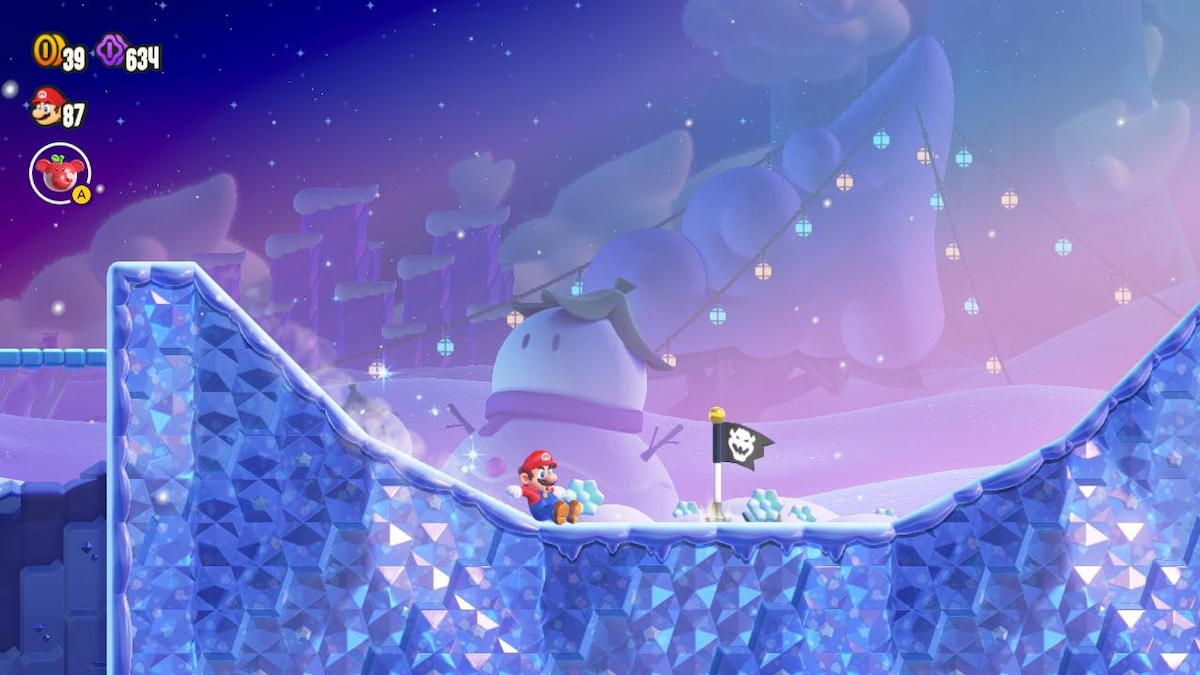
Keep me in a daydream, keep me goin’ strong
Typically, when I’m collecting my thoughts for a review, I tend to lean towards criticisms and nitpicks. My philosophy is that I’d rather put all my apprehensions on the table so that you, the reader, can decide if a game is going to entertain you or grate on you. I’ve tried to do that a bit here, and I’ll also note that the boss encounters in Super Mario Bros. Wonder may not be the best, either. They get the job done, don’t get me wrong. But even the final boss encounter felt relatively restrained with how wacky the game gets with the Wonder Flower effects. Wonder never really feels bad, but some parts are maybe just okay.
But when I think about how I felt actually playing Super Mario Bros. Wonder, all those criticisms just float away from my mind. Of all the smash hit video games released this year, Super Mario Bros. Wonder is the only title that I legitimately had a hard time putting down. The levels are just so consistently fantastic that I wanted to always see what was waiting for me ahead. By the time I had hunted down every secret and saw all that there was to see, I actually felt sad the experience was over.
I do think, in some small ways, Wonder could be more than what it is. But what’s already there is so good that I’m not sure if many people will really mind. I honestly went into this one with tepid expectations. But within about an hour of playing, I realized Nintendo has truly crafted something special here.
Super Mario Bros. Wonder is the first Mario game in literal decades to live up to the plumber’s legendary 2D platforming legacy. It is a return to levels overflowing with creativity, a world rich with secrets to uncover, and controls that make the mere act of movement fun. Whether Wonder exceeds or meets the quality of Super Mario Bros. 3 or World is for the fans to debate. But that aside, I’m confident in saying that Mario’s latest adventure is one of the best side-scrollers you’ll find on the Switch. Long live 2D Mario!
[This review is based on a retail build of the game provided by the publisher.]
